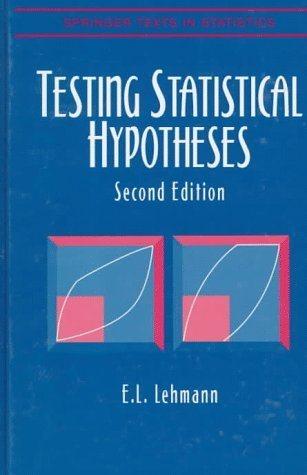14. Extension of Lemma 2. Let Po and P, be two distributions with densities Po, P such...
Question:
14. Extension of Lemma 2. Let Po and P, be two distributions with densities Po, P such that p(x)/Po(x) is a nondecreasing function of a real-valued statistic T(x). (i) If 7 has probability density p; when the original distribution is P,, then P(1)/Po(1) is nondecreasing in 1. (ii) E(T) E(7) for any nondecreasing function 4. (iii) If p(x)/Po(x) is a strictly increasing function of = T(x), so is Pi(t)/Po(t), and E(T) < E(T) unless [T(x)] is constant a.e. (Po + P) or E(T) E(T) = 0. (iv) For any distinct distributions with densities Po, P -00 Elog P(X) Po(X) Pi(X) < Elog 0. Po(X) [(i): Without loss of generality suppose that p(x)/Po(x) = T(x). Then for any integrable 4. fo(1) P{(1) dv(1) = fo[T(x)]T(x) po(x) d(x) = f(1)tp(1) dv(1), and hence pi(t)/po(t) = ta.e. = (iv): The possibility E, logl p(X)/Po(X)] co is excluded, since by the convexity of the function log, Elog [P(X)] Po(X) log Ep P(X) Po(X) -0.
Similarly for EI . The strict inequality now follows from (iii) with T( x) = PI(X)/PO(x).]
Step by Step Answer:







